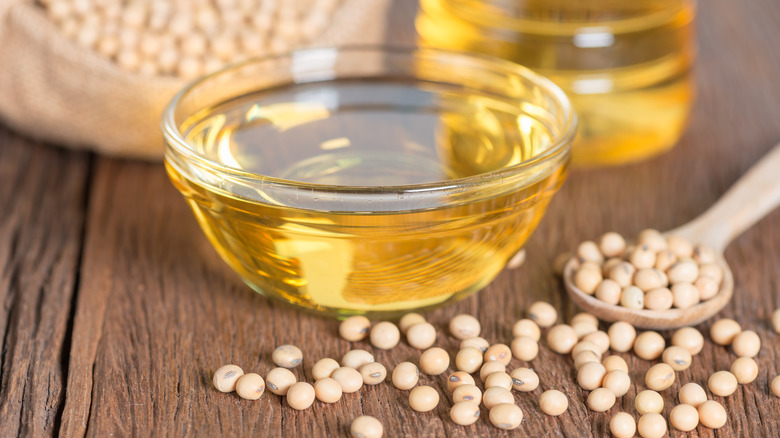What Type Of Cooking Oil Does Olive Garden Use In Their Dishes?
Along with its never-ending soup, salad, and breadsticks, Olive Garden is also quite beloved for its many tasty appetizers. Many of the homestyle restaurant's appetizers are fried, which leads customers to wonder just what type of oil is used during the cooking process. Olive Garden is considerate enough to share this information on its website, which states that the chain uses highly refined canola and soy oils when frying up menu items.
This information is crucial for a few reasons. The choice of oil can impact a person on a restricted diet due to health concerns, as certain cooking oils might negatively affect certain health conditions. Additionally, there are also concerns about allergens, particularly when it comes to the Big 9, which are allergens the FDA requires to be presented on food labels to help sensitive individuals avoid them. The Big 9 includes peanuts, milk, wheat, fish, sesame, shellfish, eggs, tree nuts, and soy.
While health and wellness might be the last thing on your mind when partaking in an Olive Garden feast, it's worth considering. Both canola and soy oil have their upsides and downsides and understanding them can help you make smart dining decisions.
What you should know about canola oil
Canola oil is one of many cooking oils used to fry food. Derived from a plant known as rapeseed, its cultivated seeds are cooked, pressed, and processed with chemicals to derive oil. Because the oil is relatively low in saturated fat, it's a great alternative to vegetable oil in terms of health. Canola oil also contains high portions of vitamins E and K.
Despite its reputation for being one of the healthiest cooking oils, there are some concerns about canola oil's potential impact on health. One major issue is the proliferation of canola oil in many foods, which increases a person's intake of omega-6 fatty acids at the expense of omega-3 fatty acids, which are found in fewer foods. Consuming more omega-6 fatty acids and fewer omega-3 fatty acids is linked to a heightened disease risk, particularly for conditions like heart disease and Alzheimer's. Accordingly, people are encouraged to offset their consumption of canola oil with foods rich in omega-3s, such as eggs and salmon.
Is soy protein bad for you?
While Olive Garden does use highly refined soy oil when preparing delicious fried appetizers for guests, the restaurant makes a point of stating that the oil does not contain soy protein. Soy protein is a major draw for people adhering to plant-based diets, as it provides an essential nutrient that's typically acquired from meat. However, the protein in soy can also cause allergic reactions in sensitive individuals due to antibodies developed by the immune system. When an allergic person consumes soy protein, these antibodies cause an array of effects which can sometimes be severe.
Fortunately, the refining process is able to remove most of the protein from soybean oil, thereby rendering it safe for consumption, even for people with existing allergies. Soybean oil does contain some protein, but the amount is so low that it doesn't typically cause an allergic reaction. Accordingly, Olive Garden's choice to use highly refined soy oil in addition to highly refined canola oil ensures that more customers can enjoy their menu items without concerns about potential allergic reactions.


